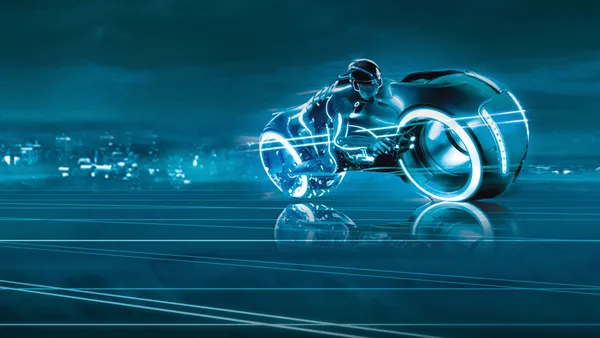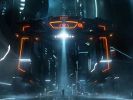Eye For Film >> Movies >> TRON: Legacy (2010) Film Review

Made at a time when nobody had heard of the internet, and two years before the first Apple Macintosh would change home computing forever, Steven Lisberger's Tron (1982) was a curiosity. One of the first major studio films to to make extensive use of computer-generated imagery and to be set in a virtual reality world, it was to prove, along with The Black Hole (1979), a box office failure for Disney, driving the studio away from live-action films for the next decade.
Viewed today, though, it holds up rather well. Sure the plotting is mostly sub-Star Wars adolescent wish fulfilment, but it allows present-day viewers to bask in the nostalgia of its outmodedness, and to nod knowingly at its occasional flashes of prescience. Meanwhile, the film's then state-of-the-art visual veneer has, with the passage of time, transcended its rapidly dating clunkiness to become, not unlike the expressionism in Lang's Metropolis (1927), the acceptable face of stylisation in speculative fiction.

That was then, this is now. In our own age of Web 2.0, online gaming and cybercrime, it seems only natural that Lisberger's vision should be ripe for a radical reboot – and sure enough, Joseph Kosinski's sequel TRON: Legacy gives the original a full upgrade. Here advances in CGI are shown off at their most cutting edge, and all those games with 'light cycles' and frisbee-like 'discs' are revisited in an expanded form that is far more thrilling and spectacular. It is even, predictably, in 3D - although 3D of that pointlessly 'subtle' (ie barely noticeable) variety that is so popular with filmmakers today. All of which is to say that you are unlikely to see a better-looking film this year or a film that is more of its moment – but if you see this a few years hence, it will no doubt already have started looking as redundant as an Eighties arcade game.
In a sense, though, this redundancy has been built into its themes and texture. The virtual action is set not in the internet, but in a parallel, orphaned network (known as 'the Grid') that has been growing and evolving autonomously since the Eighties without ever quite losing its essential Eighties feel. Jeff Bridges returns to the role of pioneering programmer Kevin Flynn, an ageing, grey-bearded version of his former self, who has been trapped in the Grid since 1989. There his vision of a perfect utopia is being enacted with uncompromising fascism by a programme named CLU that Kevin created decades ago in his own image. Bridges also plays CLU, digitally 'de-aged' to resemble both the younger Kevin of the first film, and a glitchy avatar stuck in the 'uncanny valley' of eternal computer-generated youth. As Kevin's own dark half, and a reflection of the narcissistic fixity to be found in any closed system, CLU makes for a much more interesting villain, at least conceptually, than Dillinger/Sark ever was in the first film.
If Dillinger is absent from this sequel, his dubious corporate philosophy abides in the person of his son Edward (played by an uncredited Cillian Murphy), shown in an early scene declaring: "The idea of sharing software or giving it away for free disappeared with Kevin Flynn", as though the ideological battles depicted in the first film have just been passed down to the next generation. For while most sequels relate to their originals like children to parents, occasionally sequels literalise this relationship by bringing the now older hero of the original into direct contact with his offspring and in TRON: Legacy (whose very title advertises a preoccupation with generational heritage), Kevin Flynn comes with not one but three very different kinds of children.
For aside from his digital clone CLU, a Frankenstein's monster who embodies and fossilises ideas long-abandoned by its creator, there is also Quorra (Olivia Wilde), a mysterious new digital entity that Kevin has adopted as his own daughter, and Sam (Garrett Hedlund), Kevin's real-world son who has not set eyes on his father since childhood and now, aged 27, has become a disgruntled delinquent. Here Sam is ostensibly the main character, and the central narrative is driven by his coming of age as he gradually takes over his father's reins - or at least his father's girl, business and antique Ducati motorbike.
Much is made of the contrast between the father, who is a slightly ridiculous old hippy given to lines such as: "You're messing with my Zen thing, man", and the son, who is an impetuous adrenaline junkie – but their common rebelliousness and desire to make all information 'free and open' make it clear that the two Flynns, though from different eras, are ultimately cut from the same cloth. Garrett Hedlund may be the new kid on the Grid – but for some of us, Bridges will always be the Dude.
No matter how formulaic the clichés from which this story has been stitched, or how ropey some of the dialogue used to convey Kevin's paternal wisdom, Bridges' mere presence brings his every scene to life. Sam may get most of the action, but he is just re-running races that Kevin had already won years ago, while it is only the fear of fuelling CLU's dangerous ascendancy that prevents Kevin from taking action and deploying his own God-like powers – at least until the endgame.
"What's next?", Quorra asks Sam near the film's close – and the filmmakers have evidently approached their materials with a similar question in mind. An entire subplot concerning Quorra's origins has little point to it beyond setting up events for the next sequel – and the same would appear to be true of the reappearance of the 'programme' character Tron, who is utterly unimportant here except insofar as his presence justifies the use of his name in the film's title, and hints perhaps at a more important role in future instalments.
Bruce Boxleitner reprises the part of Alan Bradley, Tron's user in the real world – but Tron himself remains hidden behind a helmet throughout, rendering futile any attempt to locate Boxleitner's (younger) face in his digital features, or to discern any genuine character in him at all. Tron has been shoe-horned into the narrative with so little regard for psychological make-up or motivation that when, in the film's climax, he is required to make a dramatic choice, his decision, though momentous, hardly seems earned, and rings hollow.
These are major flaws in a film whose considerable duration ought to leave no room for underwriting. It may well be that the target demographic cares little for the intricacies of plotting, and is just happy for Kosinski to cut to the next chase – but where the original Tron at least had the virtue of being way ahead of the curve, this late-Noughties light show, though certainly offering plenty of eye candy, feels caught between the weight of history and the potentiality of its future franchise.
Reviewed on: 09 Dec 2010


















